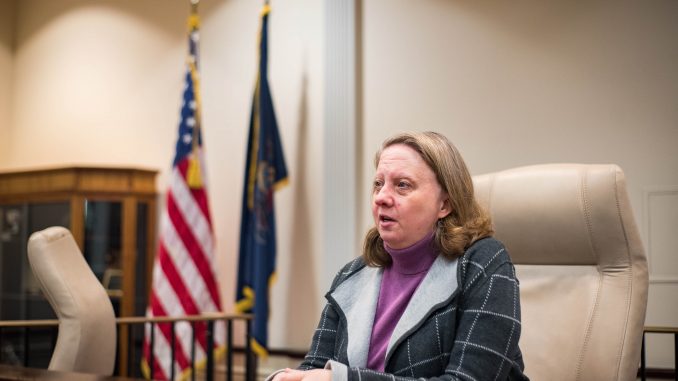
Upon walking into the courtroom, Sara Jacobson saw something completely unfamiliar to her in the United States: defendants of a homicide case shackled together during court proceedings.
“I know that is done in some countries, but I never got to see that before,” Jacobson said.
Jacobson, the director of trial advocacy and associate professor at the Beasley School of Law, took a two-week trip to Kampala, Uganda’s capital, in November 2019. During her visit, she had an opportunity to sit in at the High Court of Uganda, the third-largest judicial court in the country. It serves as the trial court level for significant criminal cases in Kampala, Jacobson said.
“I never think that we do everything perfectly,” she added. “My hope was to go to court and learn from the way they do things, even if I could only sit in for a brief period of time, and see if they were doing anything better over there that I could bring back here or perhaps add to my teaching.”
Jacobson, who previously worked as a public defender in Philadelphia, was offered the trip from a colleague who couldn’t make it. She taught trial advocacy in Beijing, China last spring, and the opportunity to teach lawyers in another new country excited her.
One thing she realized was that unlike the U.S., the Ugandan court didn’t offer translation for defendants.
“It was a verdict for a homicide case and things were not translated in the defendant’s local language so they could not understand what was going on,” Jacobson said.
When the short translation started, the judge told the person translating to give the defendant a quick summary of the proceeding, she said. In U.S. courts, defendants need to be told everything said during the entire proceeding.
“It made me appreciate the rights that we have here,” Jacobson said. The one-day visit of the courtroom made her realize the similarities, differences and “then some things that seemed to be unfair,” she added.
For the other days of her trip, she was teaching a trial advocacy program at the African Centre of Legal Excellence, a law institute in Kampala. Compared to her 12-student class at Temple, her class at the center only had three students, all of who were government lawyers from African countries.
Trial advocacy, or the practice of making lawyers more effective in courtrooms, is a skill that transfers to speaking on behalf of others, said Marian Braccia, director of the master of laws in the Trial Advocacy Program.
“You’re learning new ways to present information, to tell stories and also be mindful of the different cultures in which we should practice, and cultures we should respect and understand in order to be persuasive and effective to our very diverse audiences and juries,” she added.
Seeing different styles of trial law is beneficial, said Sonjay Singh, a former student in Jacobson’s Trial Advocacy course.
“The law in many places is out of a self-governing profession and it is one where we are always expected to hold another accountable,” Singh said.
Though Jacobson enjoyed her trip to Uganda, she sometimes felt concerned due to the country’s unacceptance for people in the LGBTQ community, considering Jacobson herself identifies as an LGBTQ individual.
After her visit, she wanted to learn more about the common law system based in British advocacy, so the techniques she teaches American and foreign students are as useful to them as possible, she said. The African Centre for Legal Excellence invited her to teach again, so she’ll be teaching in Kenya this summer.
“It was not always comfortable, but I got to meet some great people and experience a different part of the world,” Jacobson said. “I learned new things while having the opportunity to teach. I would love to go back, and my hope is that this will continue.”



Be the first to comment